The Best 10 Alternatives to Sysdig (+ Pricing & Reviews)
Twingate Team
•
Jul 27, 2024

Sysdig provides security solutions for containers, Kubernetes, and cloud environments, focusing on real-time threat detection, vulnerability management, and cloud security posture management. While Sysdig offers robust features, it may not be the ideal choice for every organization. This article explores the benefits and limitations of Sysdig's offerings.
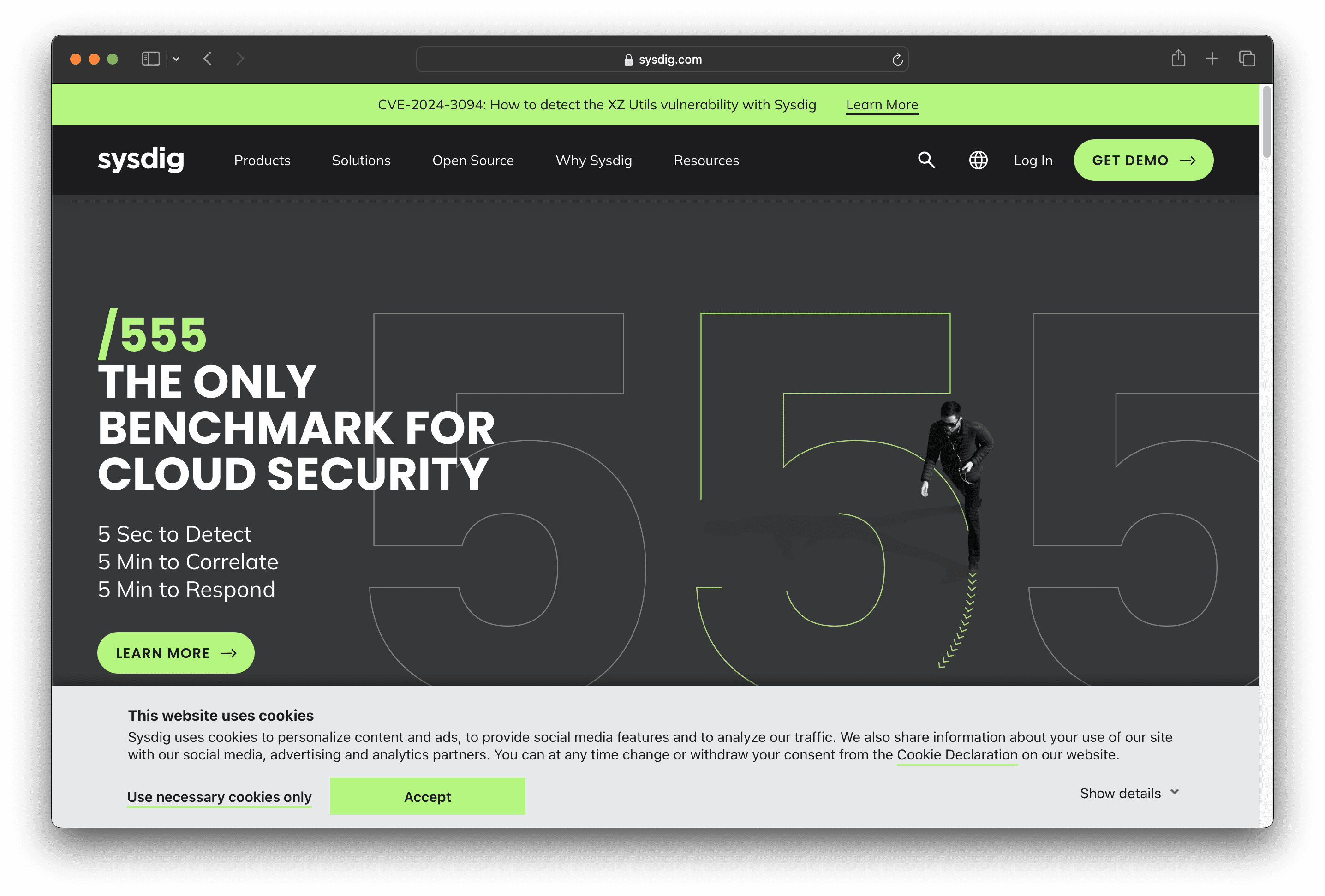
10 Alternatives to Sysdig
1. Qualys
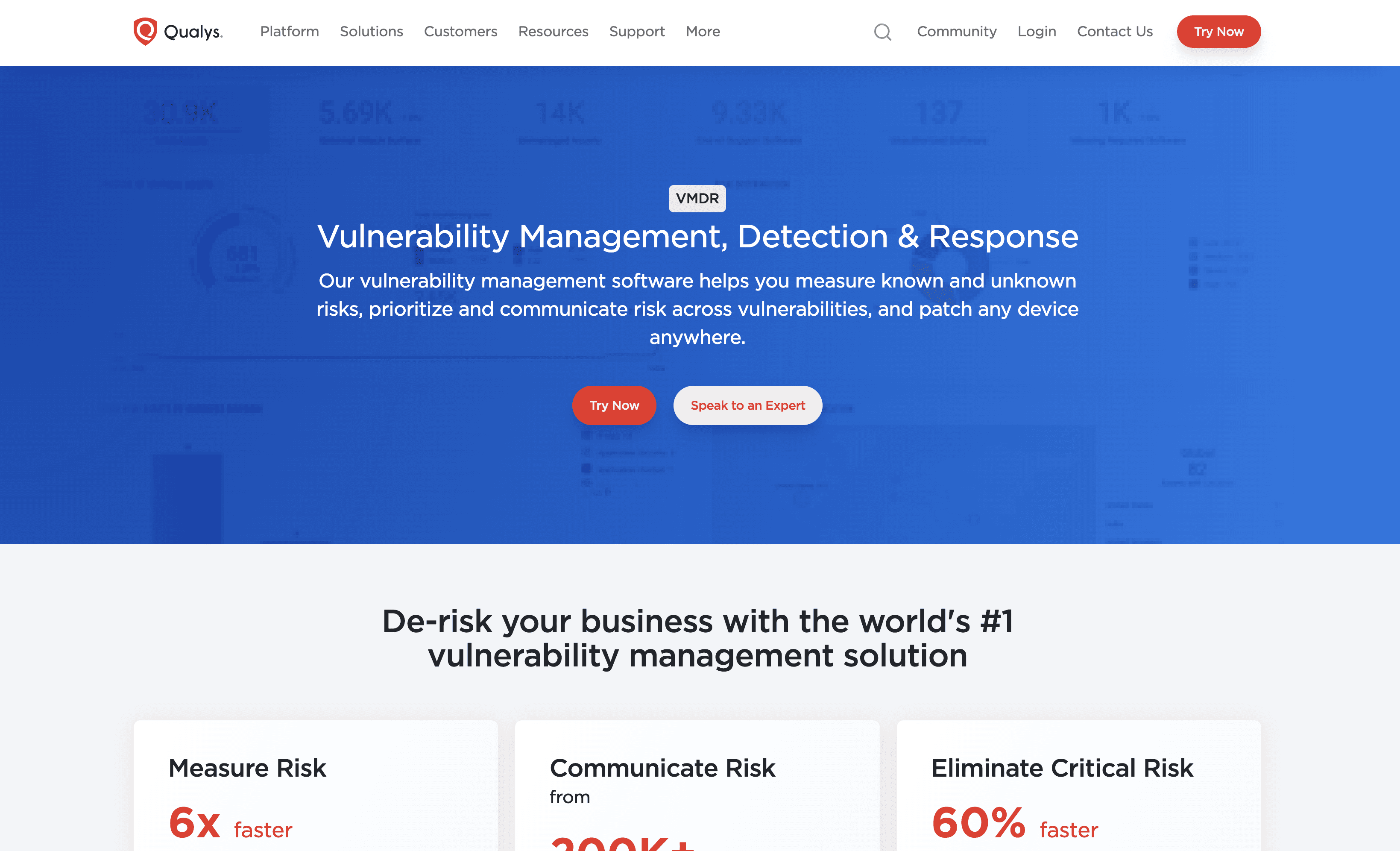
Qualys is a cybersecurity platform designed to provide comprehensive vulnerability management, detection, and response. It aims to help organizations identify and mitigate risks in real-time, ensuring robust protection against cyber threats. With its user-friendly interface and scalable solutions, Qualys is suitable for businesses of all sizes.
Qualys Pricing
Qualys's pricing is not public. Contact their support for more info.
Qualys Reviews
Qualys has an overall rating of 4.1 out of 5 stars based on 21 reviews. Users appreciate the up-to-date information on current vulnerabilities. Check out more of our reviews here!
Pros and Cons of Qualys
Pros:
Qualys VMDR measures risk 6x faster than competitors, providing a significant advantage in vulnerability management.
Sources vulnerabilities from over 25 threat intelligence feeds, ensuring comprehensive coverage and up-to-date information.
Eliminates critical risk 60% faster with one-click workflows and ITSM integrations, enhancing efficiency and response time.
Cons:
Licensing costs can accumulate quickly, making it potentially expensive for budget-conscious organizations.
The web portal is often described as clumsy and not intuitive, which can hinder user experience.
Scanning processes can be slow, and some users report false positives, affecting the tool's reliability.
2. OPSWAT Security Score
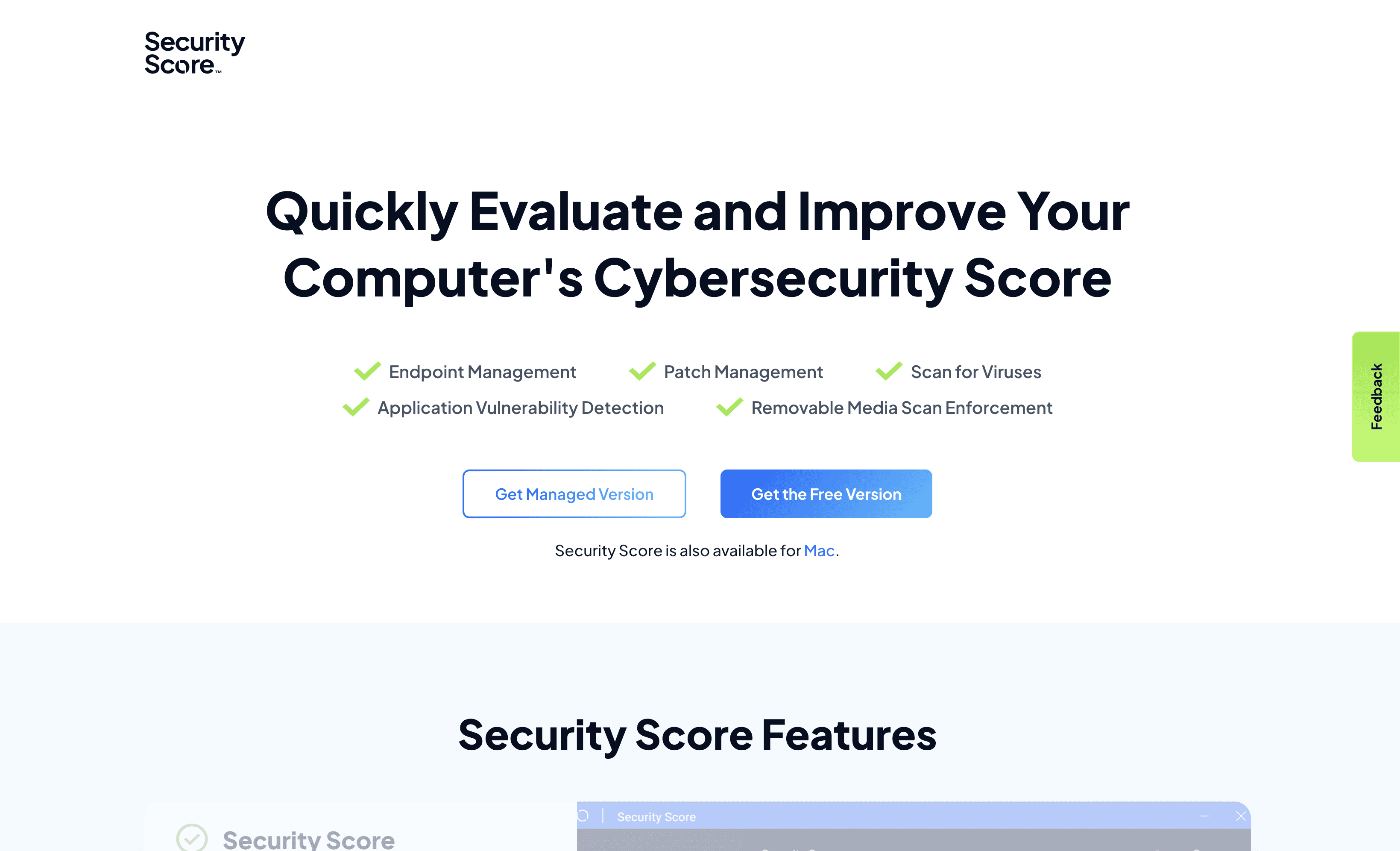
OPSWAT Security Score is a tool designed to evaluate and enhance your computer's cybersecurity. It offers features like endpoint management, patch management, and malware scanning. The tool aims to provide a comprehensive security assessment, ensuring your system is protected from external threats and vulnerabilities.
OPSWAT Security Score Pricing
OPSWAT Security Score's pricing is not public. Contact their support for more info.
OPSWAT Security Score Reviews
OPSWAT Security Score has an overall rating of 4.0 out of 5 stars based on 10 reviews. Users appreciate its comprehensive security assessment. Check out more of our reviews here!
Pros and Cons ofOPSWAT Security Score
Pros:
Comprehensive cyber-risk evaluation based on multiple factors, including OS updates, firewall status, and malware protection.
Automatic patch management for third-party applications and OS updates, ensuring systems are always up-to-date.
Advanced malware scanning using multi-engine AV, sandboxing, and Deep CDR for thorough threat detection.
Cons:
Potential complexity in managing and configuring the tool for optimal use, which may require technical expertise.
Dependence on multiple technologies can demand significant system resources, potentially affecting performance.
Possible limitations in the free version compared to the managed version, restricting some advanced features.
3. Pentera
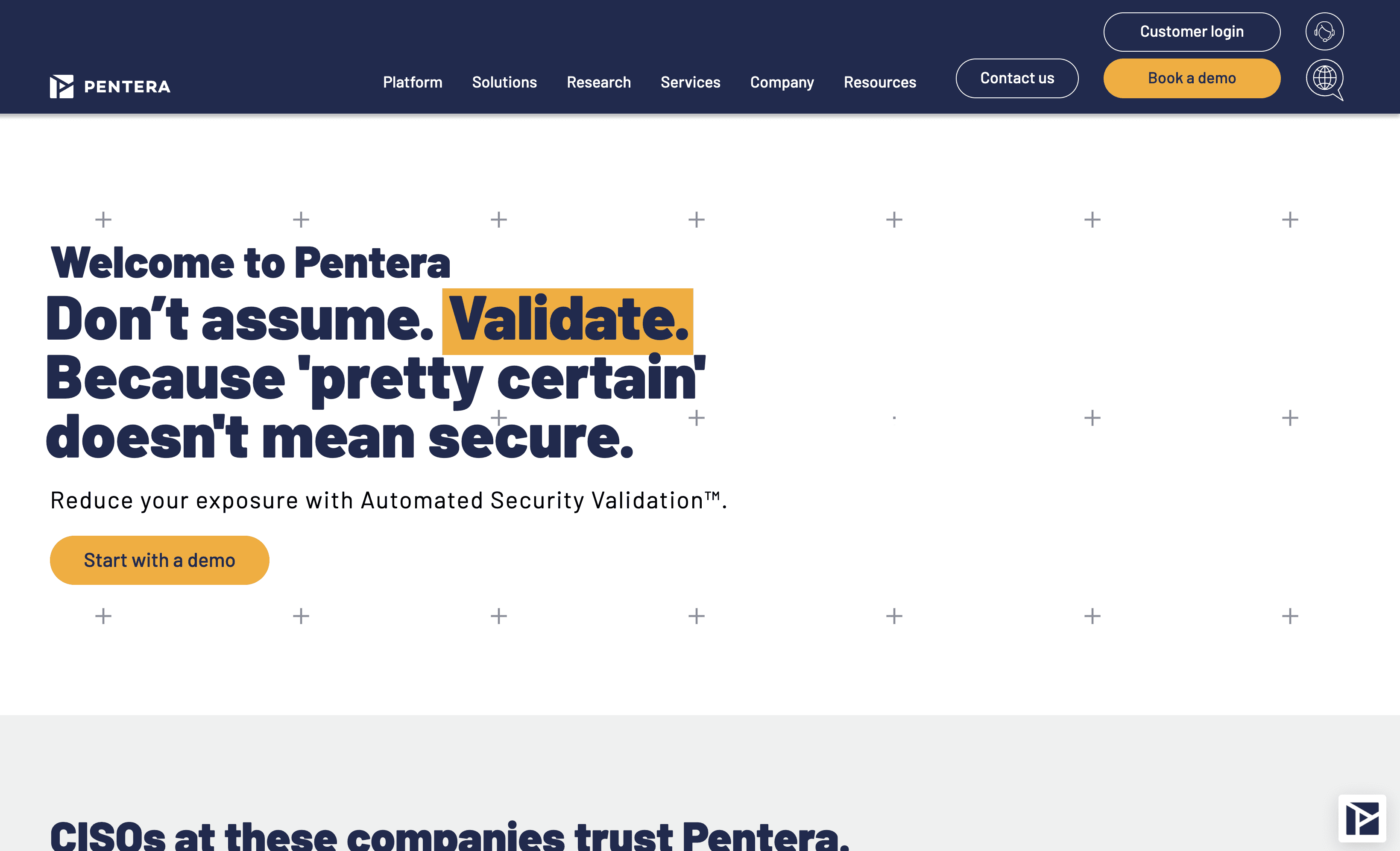
Pentera is an Automated Security Validation platform that continuously tests cybersecurity defenses against the latest threats. It identifies and prioritizes security gaps, guiding remediation efforts to enhance overall security. Designed for ease of use, Pentera helps organizations reduce cyber exposure effectively.
Pentera Pricing
Pentera's pricing is not public. Contact their support for more info.
Pentera Reviews
Pentera has an overall rating of 4.5 out of 5 stars based on 130 reviews. Users appreciate its ease of use and detailed remediation guidance. Check out more of our reviews here!
Pros and Cons of Pentera
Pros:
Automated Security Validation: Continuously tests defenses against the latest threats, ensuring up-to-date protection.
Ease of Use: User-friendly interface simplifies the process of identifying and addressing security gaps.
High ROI: Significant return on investment, with an expected ROI range of 525% to 600%.
Cons:
Expensive: High costs may be a barrier for smaller organizations with limited budgets.
Complexity: Implementing and managing the platform might require specialized knowledge and training.
Dependence on Updates: Effectiveness relies on continuous updates to keep up with the latest threats.
4. Proofpoint
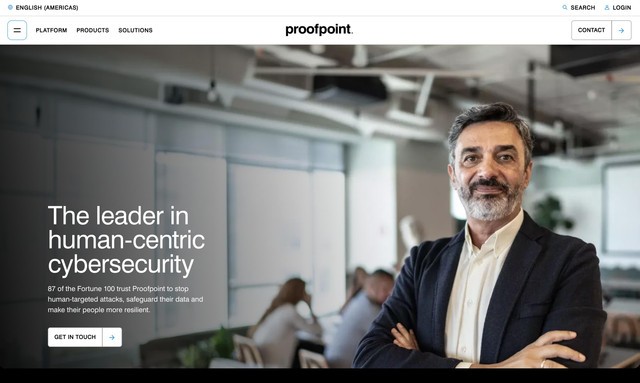
Proofpoint is a cybersecurity solution designed to protect organizations from cyber threats by focusing on their greatest assets: people. It offers comprehensive protection through email security, data loss prevention, and insider threat management, ensuring robust defense against targeted attacks and data breaches.
Proofpoint Pricing
Proofpoint's pricing is not public. Contact their support for more info.
Proofpoint Reviews
Proofpoint has an overall rating of 4.6 out of 5 stars based on 498 reviews. Users appreciate its high detection rates and ease of use. Check out more of our reviews here!
Pros and Cons of Proofpoint
Pros:
Human-Centric Approach: Proofpoint focuses on protecting people, not just systems, ensuring comprehensive security.
Comprehensive Solutions: Offers a wide range of products, including threat defense, information protection, and compliance.
Industry Recognition: Trusted by 87 of the Fortune 100 companies, highlighting its reliability and effectiveness.
Cons:
Complexity: The extensive range of products can be overwhelming for smaller organizations.
Cost: High-level security solutions can be expensive, limiting accessibility for smaller businesses.
Implementation: Setting up a multi-layered security platform may require significant time and resources.
5. CrowdStrike Falcon
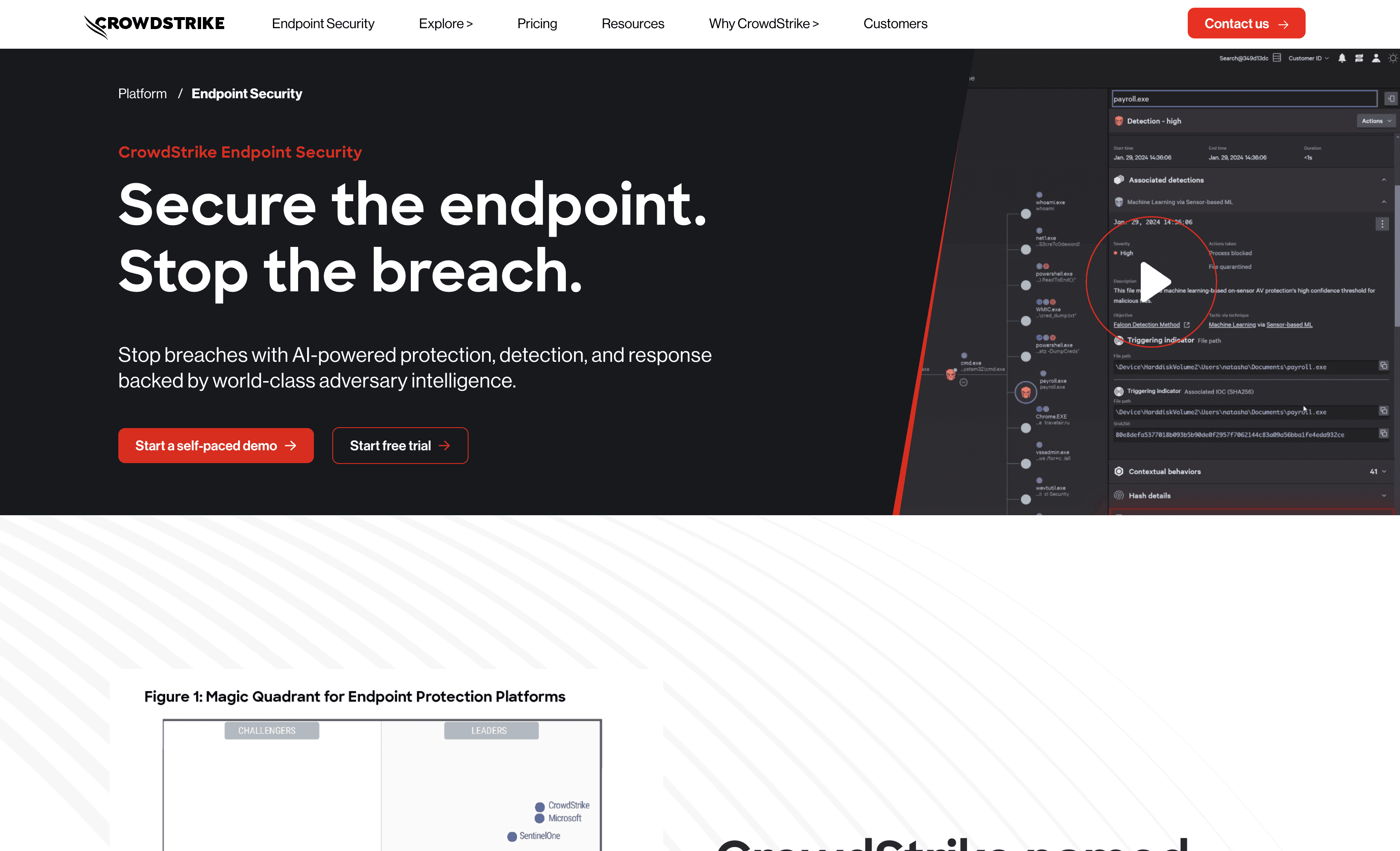
CrowdStrike Falcon is an endpoint security solution designed to protect against cyber threats using AI-powered detection and response. It offers comprehensive protection for devices, ensuring robust security for businesses of all sizes. With easy deployment and management, Falcon aims to stop breaches before they cause damage.
CrowdStrike Falcon Pricing
Falcon Pro: $99.99/device annually
Falcon Enterprise: $184.99/device annually
Falcon Go: $59.99/device annually
Falcon Elite: Contact sales for pricing
Falcon Complete MDR: Contact sales for pricing
CrowdStrike Falcon Reviews
CrowdStrike Falcon has an overall rating of 4.7 out of 5 stars based on 278 reviews. Users appreciate its advanced threat intelligence and ease of use. Check out more of our reviews here!
Pros and Cons of CrowdStrike Falcon
Pros:
AI-Powered Protection: Utilizes advanced AI and machine learning to detect and block threats early in the kill chain.
Comprehensive Coverage: Protects all major operating systems, including Windows, macOS, Linux, and ChromeOS.
Unified Visibility: Provides visibility across cloud, endpoints, and identities to detect cross-domain attacks.
Cons:
Complexity: The platform may be complex for non-experts to fully utilize without proper training or managed services.
Cost: Advanced features and comprehensive coverage might come at a higher cost compared to simpler solutions.
False Positives: Some users report false positives, which can affect the tool's reliability.
6. Prisma Cloud
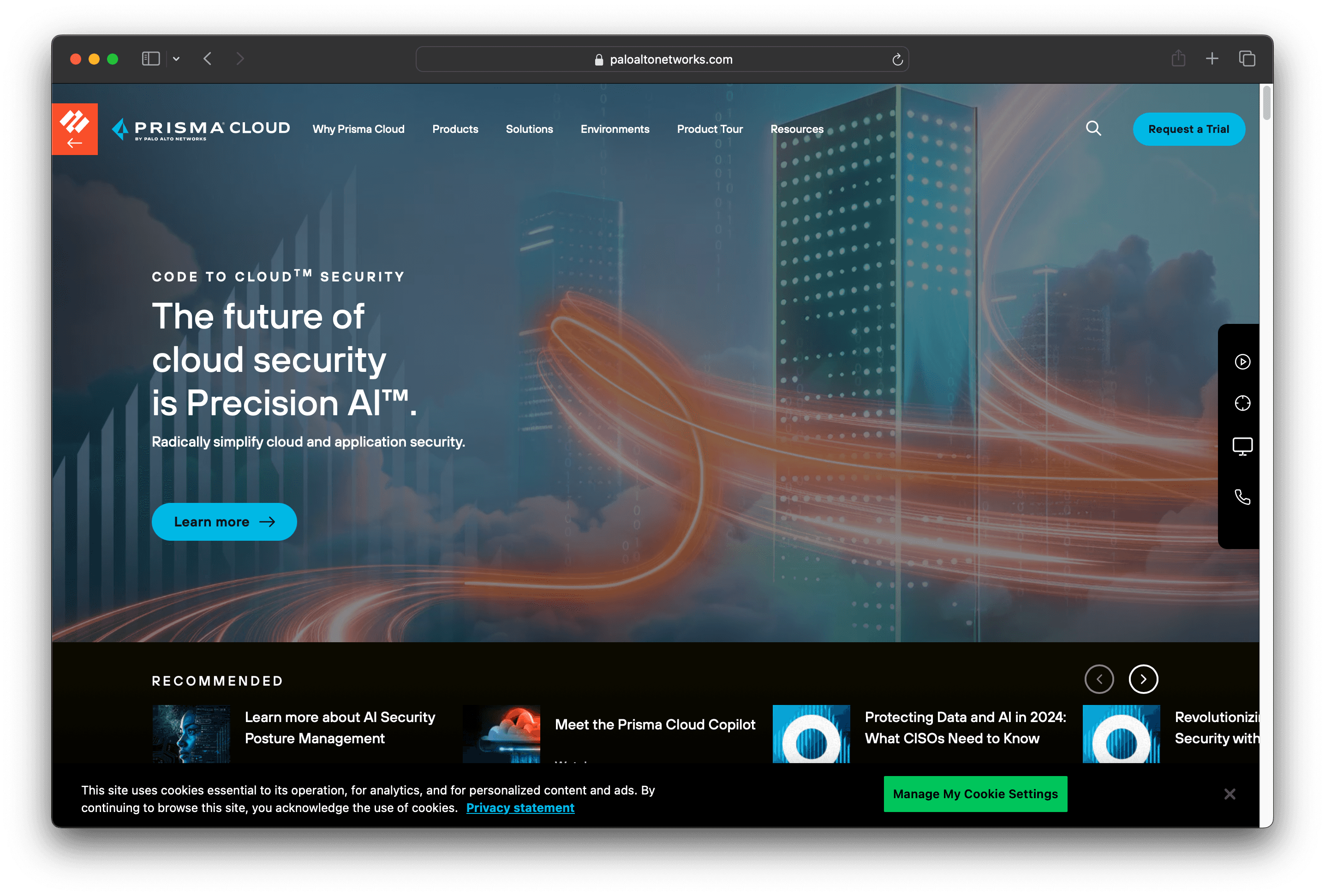
Prisma Cloud is a cloud security platform by Palo Alto Networks, designed to secure applications from code to cloud. It leverages AI to enhance security measures, providing comprehensive protection across the application lifecycle. With its user-friendly interface, Prisma Cloud aims to simplify cloud security for businesses of all sizes.
Prisma Cloud Pricing
Prisma Cloud's pricing is not public. Contact their support for more info.
Prisma Cloud Reviews
Prisma Cloud has an overall rating of 3.8 out of 5 stars based on 28 reviews. Users appreciate its comprehensive security tools. Check out more of our reviews here!
Pros and Cons of Prisma Cloud
Pros:
Comprehensive security across the application lifecycle, from code to cloud, ensuring robust protection at every stage.
AI-powered risk prioritization and threat detection, enhancing the platform's ability to identify and mitigate risks effectively.
Developer-friendly tools for secure code, making it easier for developers to integrate security into their workflows.
Cons:
High cost and complex pricing models can be prohibitive for smaller organizations with limited budgets.
Integration issues with certain cloud environments, which may require additional configuration and support.
High number of false positives, potentially leading to unnecessary alerts and wasted resources.
7. ManageEngine Desktop Central
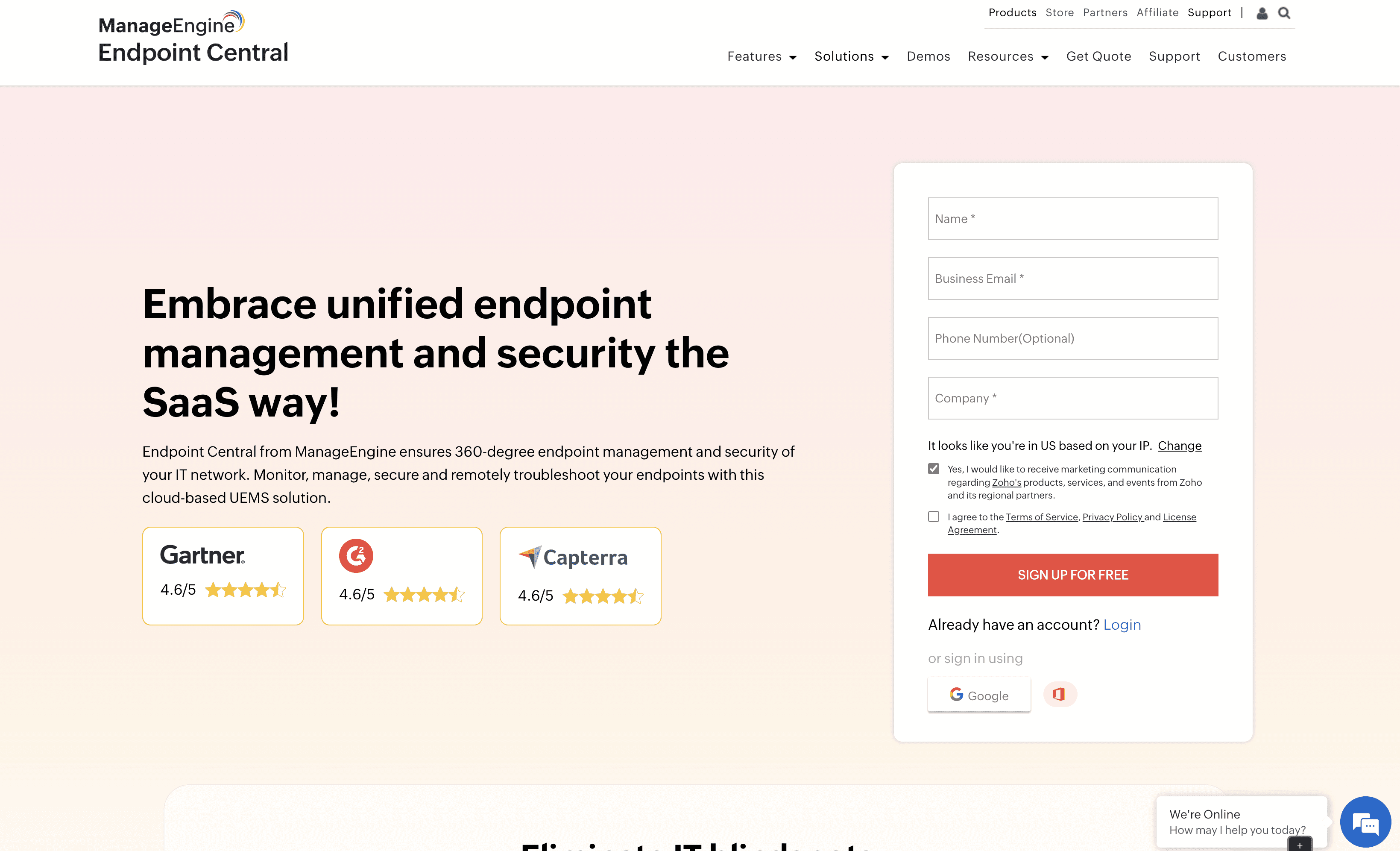
ManageEngine Desktop Central is a cloud-based unified endpoint management and security solution. It allows businesses to monitor, manage, secure, and troubleshoot IT network endpoints from a single console. Designed for ease of use and scalability, it supports desktops, laptops, smartphones, and tablets, ensuring comprehensive endpoint security.
ManageEngine Desktop Central Pricing
ManageEngine Desktop Central's pricing is not public. Contact their support for more info.
ManageEngine Desktop Central Reviews
ManageEngine Desktop Central has an overall rating of 4.2 out of 5 stars based on 20 reviews. Users appreciate its comprehensive endpoint management features. Check out more of our reviews here!
Pros and Cons of ManageEngine Desktop Central
Pros:
Comprehensive Management: Unified endpoint management and security from a single console, simplifying IT operations.
Automated Patch Deployment: Efficiently automates patch deployment for various operating systems and third-party applications.
Effective Device Management: Manages and secures mobile devices, apps, and data, ensuring robust endpoint security.
Cons:
Lack of Customization: Limited customization options can restrict tailored configurations for specific needs.
Connection Issues: Users report occasional connection problems, affecting remote management capabilities.
Learning Curve: Requires time and effort to master, which may be challenging for non-experts.
8. Illumio
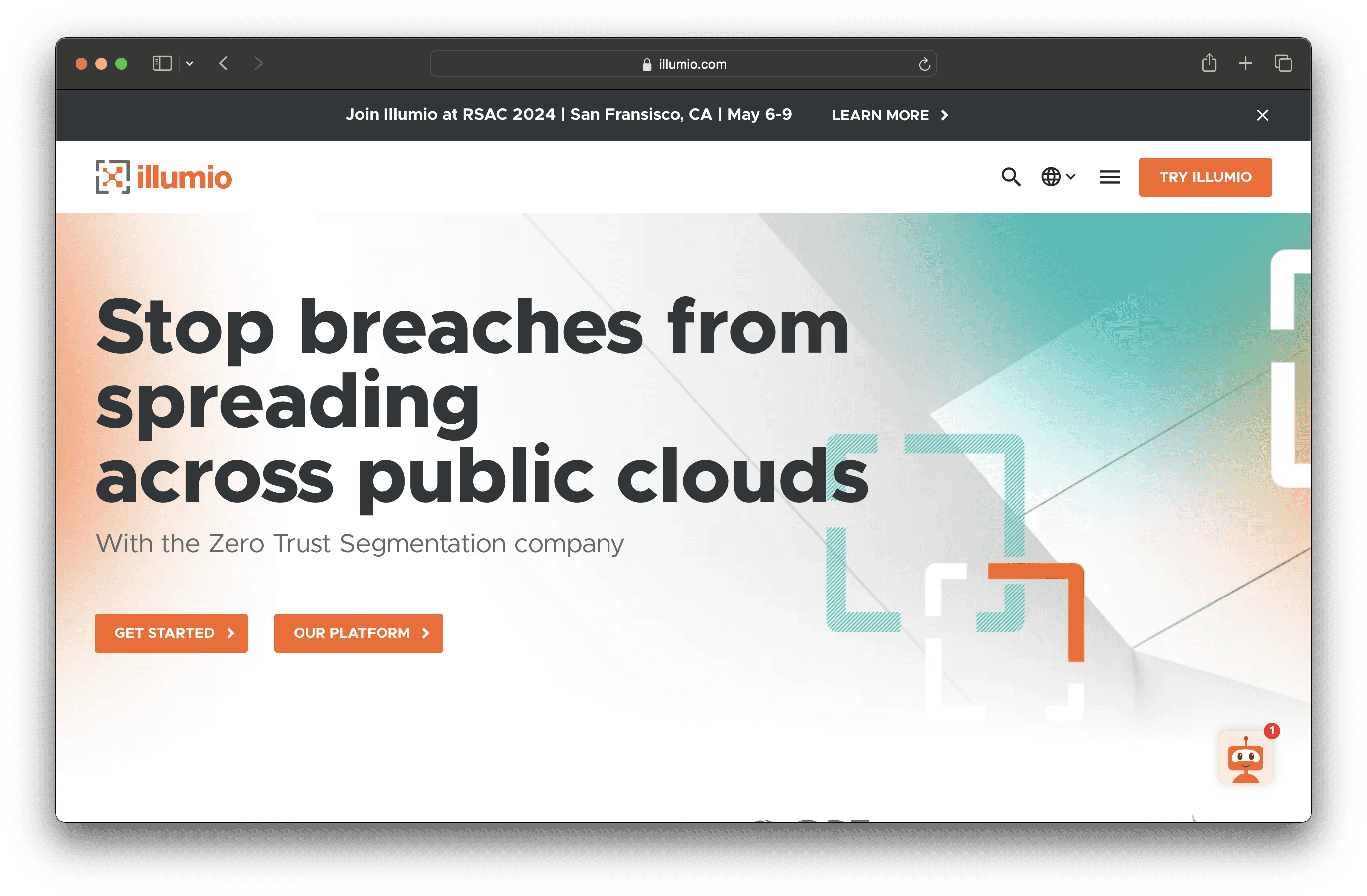
Illumio is a Zero Trust Segmentation solution designed to prevent the spread of breaches and ransomware. It visualizes communication between workloads and devices, allowing for granular segmentation policies. With its ease of deployment and immediate benefits, Illumio aims to enhance security for organizations of all sizes.
Illumio Pricing
Illumio's pricing is not public. Contact their support for more info.
Illumio Reviews
Illumio has an overall rating of 4.5 out of 5 stars based on 12 reviews. Users appreciate its strong security features and ease of use. Check out more of our reviews here!
Pros and Cons of Illumio
Pros:
Recognition and Leadership: Illumio is a leader in The Forrester Wave™: Microsegmentation Solutions, Q3 2024, and recognized in the Gartner Market Guide for Microsegmentation.
Comprehensive Platform: Offers a single console for managing segmentation across any environment, providing visibility and control over communications between workloads and devices.
Immediate Benefits: Customers report immediate visibility and actionable insights, allowing for quick and effective implementation of Zero Trust Segmentation.
Cons:
Complexity: Implementing Zero Trust Segmentation can be complex and may require significant changes to existing security architectures.
Resource Intensive: Continuous monitoring and management of segmentation policies can be resource-intensive, requiring dedicated personnel and tools.
Initial Setup: The initial setup and configuration of Illumio's platform may be time-consuming and require specialized knowledge or support.
9. Cyberark
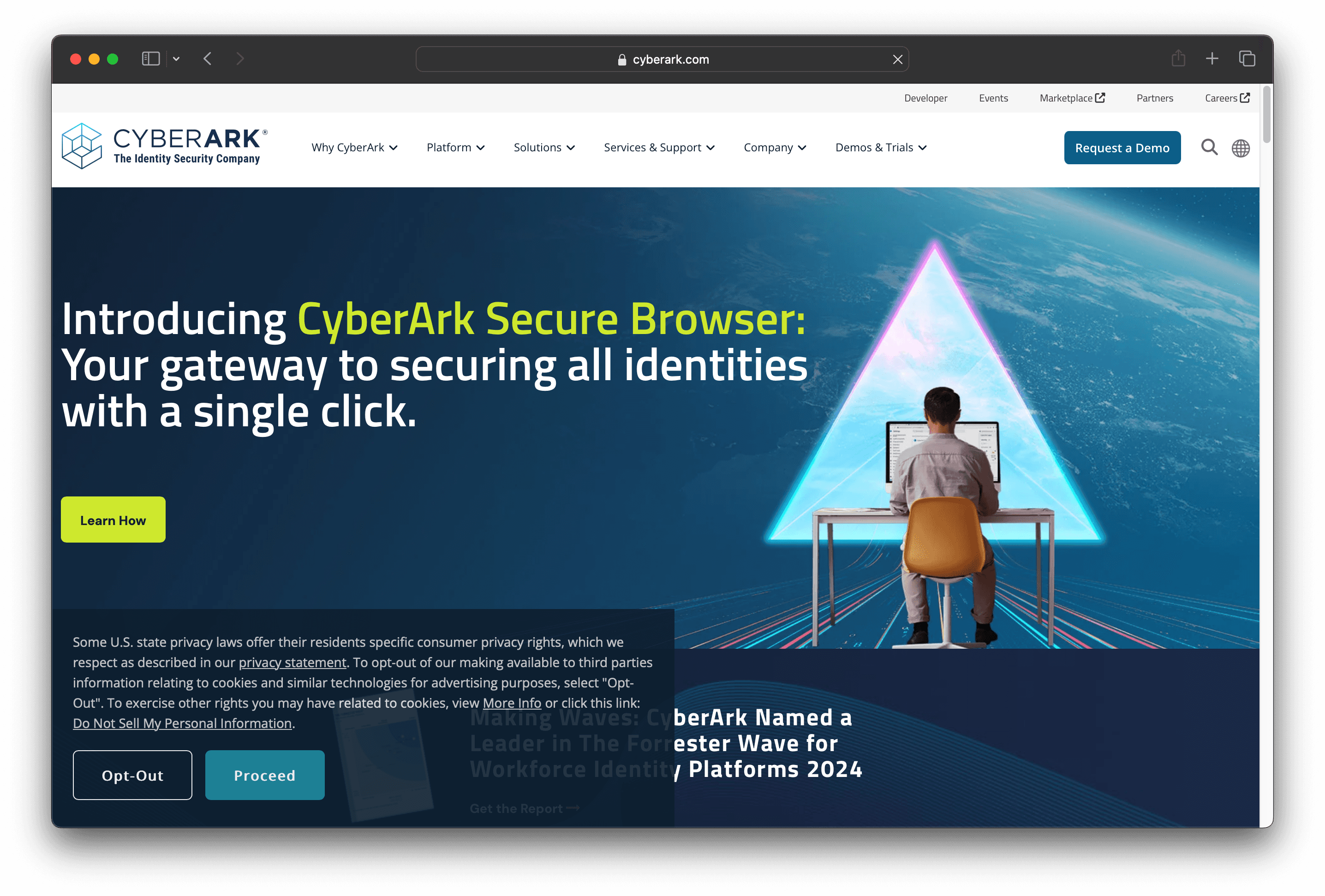
CyberArk is a security solution designed to manage and protect privileged accounts, offering automated identity lifecycle and compliance management. It aims to streamline access provisioning and enforce compliance controls, making it easier for businesses to secure their digital identities and reduce risks associated with privileged access.
Cyberark Pricing
Cyberark's pricing is not public. Contact their support for more info.
Cyberark Reviews
Cyberark has an overall rating of 4.4 out of 5 stars based on 107 reviews. Users appreciate its security features and user interface. Check out more of our reviews here!
Pros and Cons of Cyberark
Pros:
Automated Access Provisioning: Dynamically provisions and revokes access, ensuring timely and secure access management.
Identity Orchestration: Simplifies complex identity processes, making it easier to manage user identities and permissions.
Compliance Controls: Establishes comprehensive compliance and access attestation controls, ensuring regulatory adherence.
Cons:
Complexity: Implementing and managing the solution can be complex, requiring significant resources and expertise.
Cost: Advanced features and comprehensive coverage might be expensive, posing a challenge for smaller organizations.
Integration: Integrating with certain legacy systems or custom applications can be challenging, despite available marketplace integrations.
10. Lacework
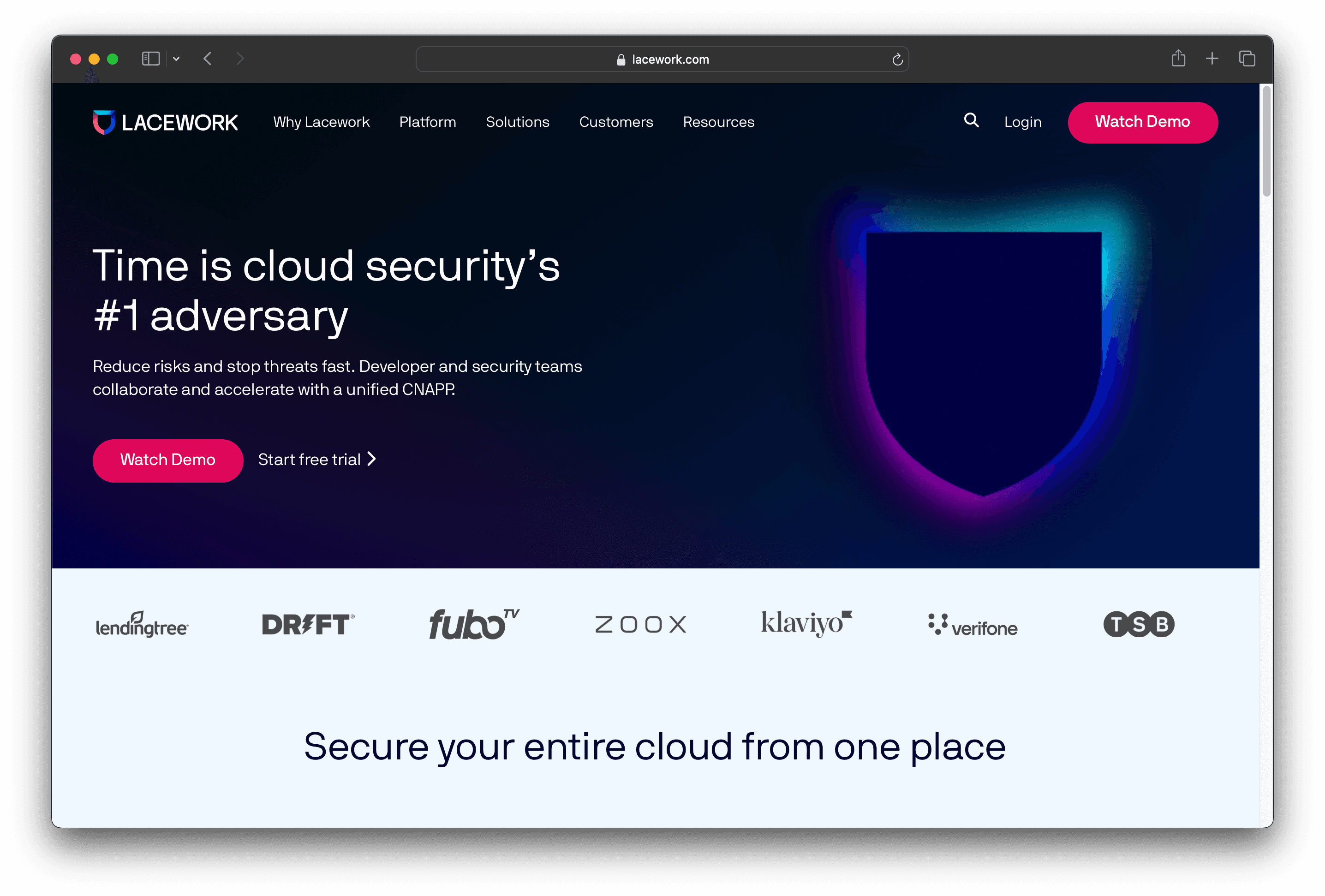
Lacework is a cloud security platform designed to provide comprehensive protection for DevOps, containers, and cloud environments. It leverages AI-driven insights for multi-cloud visibility and threat detection, ensuring robust security across the entire application lifecycle. Lacework aims to simplify security operations and enhance compliance for businesses of all sizes.
Lacework Pricing
Pro
Enterprise
Lacework's pricing is not public. Contact their support for more info.
Lacework Reviews
Lacework has an overall rating of 4.4 out of 5 stars based on 377 reviews. Users appreciate its comprehensive security features. Check out more of our reviews here!
Pros and Cons of Lacework
Pros:
Unified Security: Provides comprehensive security from code to cloud, ensuring robust protection across the entire application lifecycle.
AI-Driven Insights: Utilizes AI to enhance threat detection and risk prioritization, making it easier to identify and mitigate risks.
Developer Tools: Empowers developers with tools for secure code, including SCA, SAST, and IaC security, to fix risks early.
Cons:
Complexity: The platform's comprehensive nature can be overwhelming for new users or smaller teams.
Cost: The advanced features and comprehensive coverage might be expensive for startups or small businesses.
Integration Efforts: Initial setup and integration with existing systems may require significant effort and resources.
Looking to secure your technical infrastructure?
Twingate offers granular access controls and deployment automations to protect your VPC environment. By leveraging Zero Trust security tools, Twingate ensures that private resources and internet traffic remain secure in the modern world of work. Try Twingate for Free today!
Rapidly implement a modern Zero Trust network that is more secure and maintainable than VPNs.
The Best 10 Alternatives to Sysdig (+ Pricing & Reviews)
Twingate Team
•
Jul 27, 2024

Sysdig provides security solutions for containers, Kubernetes, and cloud environments, focusing on real-time threat detection, vulnerability management, and cloud security posture management. While Sysdig offers robust features, it may not be the ideal choice for every organization. This article explores the benefits and limitations of Sysdig's offerings.

10 Alternatives to Sysdig
1. Qualys

Qualys is a cybersecurity platform designed to provide comprehensive vulnerability management, detection, and response. It aims to help organizations identify and mitigate risks in real-time, ensuring robust protection against cyber threats. With its user-friendly interface and scalable solutions, Qualys is suitable for businesses of all sizes.
Qualys Pricing
Qualys's pricing is not public. Contact their support for more info.
Qualys Reviews
Qualys has an overall rating of 4.1 out of 5 stars based on 21 reviews. Users appreciate the up-to-date information on current vulnerabilities. Check out more of our reviews here!
Pros and Cons of Qualys
Pros:
Qualys VMDR measures risk 6x faster than competitors, providing a significant advantage in vulnerability management.
Sources vulnerabilities from over 25 threat intelligence feeds, ensuring comprehensive coverage and up-to-date information.
Eliminates critical risk 60% faster with one-click workflows and ITSM integrations, enhancing efficiency and response time.
Cons:
Licensing costs can accumulate quickly, making it potentially expensive for budget-conscious organizations.
The web portal is often described as clumsy and not intuitive, which can hinder user experience.
Scanning processes can be slow, and some users report false positives, affecting the tool's reliability.
2. OPSWAT Security Score

OPSWAT Security Score is a tool designed to evaluate and enhance your computer's cybersecurity. It offers features like endpoint management, patch management, and malware scanning. The tool aims to provide a comprehensive security assessment, ensuring your system is protected from external threats and vulnerabilities.
OPSWAT Security Score Pricing
OPSWAT Security Score's pricing is not public. Contact their support for more info.
OPSWAT Security Score Reviews
OPSWAT Security Score has an overall rating of 4.0 out of 5 stars based on 10 reviews. Users appreciate its comprehensive security assessment. Check out more of our reviews here!
Pros and Cons ofOPSWAT Security Score
Pros:
Comprehensive cyber-risk evaluation based on multiple factors, including OS updates, firewall status, and malware protection.
Automatic patch management for third-party applications and OS updates, ensuring systems are always up-to-date.
Advanced malware scanning using multi-engine AV, sandboxing, and Deep CDR for thorough threat detection.
Cons:
Potential complexity in managing and configuring the tool for optimal use, which may require technical expertise.
Dependence on multiple technologies can demand significant system resources, potentially affecting performance.
Possible limitations in the free version compared to the managed version, restricting some advanced features.
3. Pentera

Pentera is an Automated Security Validation platform that continuously tests cybersecurity defenses against the latest threats. It identifies and prioritizes security gaps, guiding remediation efforts to enhance overall security. Designed for ease of use, Pentera helps organizations reduce cyber exposure effectively.
Pentera Pricing
Pentera's pricing is not public. Contact their support for more info.
Pentera Reviews
Pentera has an overall rating of 4.5 out of 5 stars based on 130 reviews. Users appreciate its ease of use and detailed remediation guidance. Check out more of our reviews here!
Pros and Cons of Pentera
Pros:
Automated Security Validation: Continuously tests defenses against the latest threats, ensuring up-to-date protection.
Ease of Use: User-friendly interface simplifies the process of identifying and addressing security gaps.
High ROI: Significant return on investment, with an expected ROI range of 525% to 600%.
Cons:
Expensive: High costs may be a barrier for smaller organizations with limited budgets.
Complexity: Implementing and managing the platform might require specialized knowledge and training.
Dependence on Updates: Effectiveness relies on continuous updates to keep up with the latest threats.
4. Proofpoint

Proofpoint is a cybersecurity solution designed to protect organizations from cyber threats by focusing on their greatest assets: people. It offers comprehensive protection through email security, data loss prevention, and insider threat management, ensuring robust defense against targeted attacks and data breaches.
Proofpoint Pricing
Proofpoint's pricing is not public. Contact their support for more info.
Proofpoint Reviews
Proofpoint has an overall rating of 4.6 out of 5 stars based on 498 reviews. Users appreciate its high detection rates and ease of use. Check out more of our reviews here!
Pros and Cons of Proofpoint
Pros:
Human-Centric Approach: Proofpoint focuses on protecting people, not just systems, ensuring comprehensive security.
Comprehensive Solutions: Offers a wide range of products, including threat defense, information protection, and compliance.
Industry Recognition: Trusted by 87 of the Fortune 100 companies, highlighting its reliability and effectiveness.
Cons:
Complexity: The extensive range of products can be overwhelming for smaller organizations.
Cost: High-level security solutions can be expensive, limiting accessibility for smaller businesses.
Implementation: Setting up a multi-layered security platform may require significant time and resources.
5. CrowdStrike Falcon

CrowdStrike Falcon is an endpoint security solution designed to protect against cyber threats using AI-powered detection and response. It offers comprehensive protection for devices, ensuring robust security for businesses of all sizes. With easy deployment and management, Falcon aims to stop breaches before they cause damage.
CrowdStrike Falcon Pricing
Falcon Pro: $99.99/device annually
Falcon Enterprise: $184.99/device annually
Falcon Go: $59.99/device annually
Falcon Elite: Contact sales for pricing
Falcon Complete MDR: Contact sales for pricing
CrowdStrike Falcon Reviews
CrowdStrike Falcon has an overall rating of 4.7 out of 5 stars based on 278 reviews. Users appreciate its advanced threat intelligence and ease of use. Check out more of our reviews here!
Pros and Cons of CrowdStrike Falcon
Pros:
AI-Powered Protection: Utilizes advanced AI and machine learning to detect and block threats early in the kill chain.
Comprehensive Coverage: Protects all major operating systems, including Windows, macOS, Linux, and ChromeOS.
Unified Visibility: Provides visibility across cloud, endpoints, and identities to detect cross-domain attacks.
Cons:
Complexity: The platform may be complex for non-experts to fully utilize without proper training or managed services.
Cost: Advanced features and comprehensive coverage might come at a higher cost compared to simpler solutions.
False Positives: Some users report false positives, which can affect the tool's reliability.
6. Prisma Cloud

Prisma Cloud is a cloud security platform by Palo Alto Networks, designed to secure applications from code to cloud. It leverages AI to enhance security measures, providing comprehensive protection across the application lifecycle. With its user-friendly interface, Prisma Cloud aims to simplify cloud security for businesses of all sizes.
Prisma Cloud Pricing
Prisma Cloud's pricing is not public. Contact their support for more info.
Prisma Cloud Reviews
Prisma Cloud has an overall rating of 3.8 out of 5 stars based on 28 reviews. Users appreciate its comprehensive security tools. Check out more of our reviews here!
Pros and Cons of Prisma Cloud
Pros:
Comprehensive security across the application lifecycle, from code to cloud, ensuring robust protection at every stage.
AI-powered risk prioritization and threat detection, enhancing the platform's ability to identify and mitigate risks effectively.
Developer-friendly tools for secure code, making it easier for developers to integrate security into their workflows.
Cons:
High cost and complex pricing models can be prohibitive for smaller organizations with limited budgets.
Integration issues with certain cloud environments, which may require additional configuration and support.
High number of false positives, potentially leading to unnecessary alerts and wasted resources.
7. ManageEngine Desktop Central

ManageEngine Desktop Central is a cloud-based unified endpoint management and security solution. It allows businesses to monitor, manage, secure, and troubleshoot IT network endpoints from a single console. Designed for ease of use and scalability, it supports desktops, laptops, smartphones, and tablets, ensuring comprehensive endpoint security.
ManageEngine Desktop Central Pricing
ManageEngine Desktop Central's pricing is not public. Contact their support for more info.
ManageEngine Desktop Central Reviews
ManageEngine Desktop Central has an overall rating of 4.2 out of 5 stars based on 20 reviews. Users appreciate its comprehensive endpoint management features. Check out more of our reviews here!
Pros and Cons of ManageEngine Desktop Central
Pros:
Comprehensive Management: Unified endpoint management and security from a single console, simplifying IT operations.
Automated Patch Deployment: Efficiently automates patch deployment for various operating systems and third-party applications.
Effective Device Management: Manages and secures mobile devices, apps, and data, ensuring robust endpoint security.
Cons:
Lack of Customization: Limited customization options can restrict tailored configurations for specific needs.
Connection Issues: Users report occasional connection problems, affecting remote management capabilities.
Learning Curve: Requires time and effort to master, which may be challenging for non-experts.
8. Illumio

Illumio is a Zero Trust Segmentation solution designed to prevent the spread of breaches and ransomware. It visualizes communication between workloads and devices, allowing for granular segmentation policies. With its ease of deployment and immediate benefits, Illumio aims to enhance security for organizations of all sizes.
Illumio Pricing
Illumio's pricing is not public. Contact their support for more info.
Illumio Reviews
Illumio has an overall rating of 4.5 out of 5 stars based on 12 reviews. Users appreciate its strong security features and ease of use. Check out more of our reviews here!
Pros and Cons of Illumio
Pros:
Recognition and Leadership: Illumio is a leader in The Forrester Wave™: Microsegmentation Solutions, Q3 2024, and recognized in the Gartner Market Guide for Microsegmentation.
Comprehensive Platform: Offers a single console for managing segmentation across any environment, providing visibility and control over communications between workloads and devices.
Immediate Benefits: Customers report immediate visibility and actionable insights, allowing for quick and effective implementation of Zero Trust Segmentation.
Cons:
Complexity: Implementing Zero Trust Segmentation can be complex and may require significant changes to existing security architectures.
Resource Intensive: Continuous monitoring and management of segmentation policies can be resource-intensive, requiring dedicated personnel and tools.
Initial Setup: The initial setup and configuration of Illumio's platform may be time-consuming and require specialized knowledge or support.
9. Cyberark

CyberArk is a security solution designed to manage and protect privileged accounts, offering automated identity lifecycle and compliance management. It aims to streamline access provisioning and enforce compliance controls, making it easier for businesses to secure their digital identities and reduce risks associated with privileged access.
Cyberark Pricing
Cyberark's pricing is not public. Contact their support for more info.
Cyberark Reviews
Cyberark has an overall rating of 4.4 out of 5 stars based on 107 reviews. Users appreciate its security features and user interface. Check out more of our reviews here!
Pros and Cons of Cyberark
Pros:
Automated Access Provisioning: Dynamically provisions and revokes access, ensuring timely and secure access management.
Identity Orchestration: Simplifies complex identity processes, making it easier to manage user identities and permissions.
Compliance Controls: Establishes comprehensive compliance and access attestation controls, ensuring regulatory adherence.
Cons:
Complexity: Implementing and managing the solution can be complex, requiring significant resources and expertise.
Cost: Advanced features and comprehensive coverage might be expensive, posing a challenge for smaller organizations.
Integration: Integrating with certain legacy systems or custom applications can be challenging, despite available marketplace integrations.
10. Lacework

Lacework is a cloud security platform designed to provide comprehensive protection for DevOps, containers, and cloud environments. It leverages AI-driven insights for multi-cloud visibility and threat detection, ensuring robust security across the entire application lifecycle. Lacework aims to simplify security operations and enhance compliance for businesses of all sizes.
Lacework Pricing
Pro
Enterprise
Lacework's pricing is not public. Contact their support for more info.
Lacework Reviews
Lacework has an overall rating of 4.4 out of 5 stars based on 377 reviews. Users appreciate its comprehensive security features. Check out more of our reviews here!
Pros and Cons of Lacework
Pros:
Unified Security: Provides comprehensive security from code to cloud, ensuring robust protection across the entire application lifecycle.
AI-Driven Insights: Utilizes AI to enhance threat detection and risk prioritization, making it easier to identify and mitigate risks.
Developer Tools: Empowers developers with tools for secure code, including SCA, SAST, and IaC security, to fix risks early.
Cons:
Complexity: The platform's comprehensive nature can be overwhelming for new users or smaller teams.
Cost: The advanced features and comprehensive coverage might be expensive for startups or small businesses.
Integration Efforts: Initial setup and integration with existing systems may require significant effort and resources.
Looking to secure your technical infrastructure?
Twingate offers granular access controls and deployment automations to protect your VPC environment. By leveraging Zero Trust security tools, Twingate ensures that private resources and internet traffic remain secure in the modern world of work. Try Twingate for Free today!
Rapidly implement a modern Zero Trust network that is more secure and maintainable than VPNs.
The Best 10 Alternatives to Sysdig (+ Pricing & Reviews)
Twingate Team
•
Jul 27, 2024

Sysdig provides security solutions for containers, Kubernetes, and cloud environments, focusing on real-time threat detection, vulnerability management, and cloud security posture management. While Sysdig offers robust features, it may not be the ideal choice for every organization. This article explores the benefits and limitations of Sysdig's offerings.

10 Alternatives to Sysdig
1. Qualys

Qualys is a cybersecurity platform designed to provide comprehensive vulnerability management, detection, and response. It aims to help organizations identify and mitigate risks in real-time, ensuring robust protection against cyber threats. With its user-friendly interface and scalable solutions, Qualys is suitable for businesses of all sizes.
Qualys Pricing
Qualys's pricing is not public. Contact their support for more info.
Qualys Reviews
Qualys has an overall rating of 4.1 out of 5 stars based on 21 reviews. Users appreciate the up-to-date information on current vulnerabilities. Check out more of our reviews here!
Pros and Cons of Qualys
Pros:
Qualys VMDR measures risk 6x faster than competitors, providing a significant advantage in vulnerability management.
Sources vulnerabilities from over 25 threat intelligence feeds, ensuring comprehensive coverage and up-to-date information.
Eliminates critical risk 60% faster with one-click workflows and ITSM integrations, enhancing efficiency and response time.
Cons:
Licensing costs can accumulate quickly, making it potentially expensive for budget-conscious organizations.
The web portal is often described as clumsy and not intuitive, which can hinder user experience.
Scanning processes can be slow, and some users report false positives, affecting the tool's reliability.
2. OPSWAT Security Score

OPSWAT Security Score is a tool designed to evaluate and enhance your computer's cybersecurity. It offers features like endpoint management, patch management, and malware scanning. The tool aims to provide a comprehensive security assessment, ensuring your system is protected from external threats and vulnerabilities.
OPSWAT Security Score Pricing
OPSWAT Security Score's pricing is not public. Contact their support for more info.
OPSWAT Security Score Reviews
OPSWAT Security Score has an overall rating of 4.0 out of 5 stars based on 10 reviews. Users appreciate its comprehensive security assessment. Check out more of our reviews here!
Pros and Cons ofOPSWAT Security Score
Pros:
Comprehensive cyber-risk evaluation based on multiple factors, including OS updates, firewall status, and malware protection.
Automatic patch management for third-party applications and OS updates, ensuring systems are always up-to-date.
Advanced malware scanning using multi-engine AV, sandboxing, and Deep CDR for thorough threat detection.
Cons:
Potential complexity in managing and configuring the tool for optimal use, which may require technical expertise.
Dependence on multiple technologies can demand significant system resources, potentially affecting performance.
Possible limitations in the free version compared to the managed version, restricting some advanced features.
3. Pentera

Pentera is an Automated Security Validation platform that continuously tests cybersecurity defenses against the latest threats. It identifies and prioritizes security gaps, guiding remediation efforts to enhance overall security. Designed for ease of use, Pentera helps organizations reduce cyber exposure effectively.
Pentera Pricing
Pentera's pricing is not public. Contact their support for more info.
Pentera Reviews
Pentera has an overall rating of 4.5 out of 5 stars based on 130 reviews. Users appreciate its ease of use and detailed remediation guidance. Check out more of our reviews here!
Pros and Cons of Pentera
Pros:
Automated Security Validation: Continuously tests defenses against the latest threats, ensuring up-to-date protection.
Ease of Use: User-friendly interface simplifies the process of identifying and addressing security gaps.
High ROI: Significant return on investment, with an expected ROI range of 525% to 600%.
Cons:
Expensive: High costs may be a barrier for smaller organizations with limited budgets.
Complexity: Implementing and managing the platform might require specialized knowledge and training.
Dependence on Updates: Effectiveness relies on continuous updates to keep up with the latest threats.
4. Proofpoint

Proofpoint is a cybersecurity solution designed to protect organizations from cyber threats by focusing on their greatest assets: people. It offers comprehensive protection through email security, data loss prevention, and insider threat management, ensuring robust defense against targeted attacks and data breaches.
Proofpoint Pricing
Proofpoint's pricing is not public. Contact their support for more info.
Proofpoint Reviews
Proofpoint has an overall rating of 4.6 out of 5 stars based on 498 reviews. Users appreciate its high detection rates and ease of use. Check out more of our reviews here!
Pros and Cons of Proofpoint
Pros:
Human-Centric Approach: Proofpoint focuses on protecting people, not just systems, ensuring comprehensive security.
Comprehensive Solutions: Offers a wide range of products, including threat defense, information protection, and compliance.
Industry Recognition: Trusted by 87 of the Fortune 100 companies, highlighting its reliability and effectiveness.
Cons:
Complexity: The extensive range of products can be overwhelming for smaller organizations.
Cost: High-level security solutions can be expensive, limiting accessibility for smaller businesses.
Implementation: Setting up a multi-layered security platform may require significant time and resources.
5. CrowdStrike Falcon

CrowdStrike Falcon is an endpoint security solution designed to protect against cyber threats using AI-powered detection and response. It offers comprehensive protection for devices, ensuring robust security for businesses of all sizes. With easy deployment and management, Falcon aims to stop breaches before they cause damage.
CrowdStrike Falcon Pricing
Falcon Pro: $99.99/device annually
Falcon Enterprise: $184.99/device annually
Falcon Go: $59.99/device annually
Falcon Elite: Contact sales for pricing
Falcon Complete MDR: Contact sales for pricing
CrowdStrike Falcon Reviews
CrowdStrike Falcon has an overall rating of 4.7 out of 5 stars based on 278 reviews. Users appreciate its advanced threat intelligence and ease of use. Check out more of our reviews here!
Pros and Cons of CrowdStrike Falcon
Pros:
AI-Powered Protection: Utilizes advanced AI and machine learning to detect and block threats early in the kill chain.
Comprehensive Coverage: Protects all major operating systems, including Windows, macOS, Linux, and ChromeOS.
Unified Visibility: Provides visibility across cloud, endpoints, and identities to detect cross-domain attacks.
Cons:
Complexity: The platform may be complex for non-experts to fully utilize without proper training or managed services.
Cost: Advanced features and comprehensive coverage might come at a higher cost compared to simpler solutions.
False Positives: Some users report false positives, which can affect the tool's reliability.
6. Prisma Cloud

Prisma Cloud is a cloud security platform by Palo Alto Networks, designed to secure applications from code to cloud. It leverages AI to enhance security measures, providing comprehensive protection across the application lifecycle. With its user-friendly interface, Prisma Cloud aims to simplify cloud security for businesses of all sizes.
Prisma Cloud Pricing
Prisma Cloud's pricing is not public. Contact their support for more info.
Prisma Cloud Reviews
Prisma Cloud has an overall rating of 3.8 out of 5 stars based on 28 reviews. Users appreciate its comprehensive security tools. Check out more of our reviews here!
Pros and Cons of Prisma Cloud
Pros:
Comprehensive security across the application lifecycle, from code to cloud, ensuring robust protection at every stage.
AI-powered risk prioritization and threat detection, enhancing the platform's ability to identify and mitigate risks effectively.
Developer-friendly tools for secure code, making it easier for developers to integrate security into their workflows.
Cons:
High cost and complex pricing models can be prohibitive for smaller organizations with limited budgets.
Integration issues with certain cloud environments, which may require additional configuration and support.
High number of false positives, potentially leading to unnecessary alerts and wasted resources.
7. ManageEngine Desktop Central

ManageEngine Desktop Central is a cloud-based unified endpoint management and security solution. It allows businesses to monitor, manage, secure, and troubleshoot IT network endpoints from a single console. Designed for ease of use and scalability, it supports desktops, laptops, smartphones, and tablets, ensuring comprehensive endpoint security.
ManageEngine Desktop Central Pricing
ManageEngine Desktop Central's pricing is not public. Contact their support for more info.
ManageEngine Desktop Central Reviews
ManageEngine Desktop Central has an overall rating of 4.2 out of 5 stars based on 20 reviews. Users appreciate its comprehensive endpoint management features. Check out more of our reviews here!
Pros and Cons of ManageEngine Desktop Central
Pros:
Comprehensive Management: Unified endpoint management and security from a single console, simplifying IT operations.
Automated Patch Deployment: Efficiently automates patch deployment for various operating systems and third-party applications.
Effective Device Management: Manages and secures mobile devices, apps, and data, ensuring robust endpoint security.
Cons:
Lack of Customization: Limited customization options can restrict tailored configurations for specific needs.
Connection Issues: Users report occasional connection problems, affecting remote management capabilities.
Learning Curve: Requires time and effort to master, which may be challenging for non-experts.
8. Illumio

Illumio is a Zero Trust Segmentation solution designed to prevent the spread of breaches and ransomware. It visualizes communication between workloads and devices, allowing for granular segmentation policies. With its ease of deployment and immediate benefits, Illumio aims to enhance security for organizations of all sizes.
Illumio Pricing
Illumio's pricing is not public. Contact their support for more info.
Illumio Reviews
Illumio has an overall rating of 4.5 out of 5 stars based on 12 reviews. Users appreciate its strong security features and ease of use. Check out more of our reviews here!
Pros and Cons of Illumio
Pros:
Recognition and Leadership: Illumio is a leader in The Forrester Wave™: Microsegmentation Solutions, Q3 2024, and recognized in the Gartner Market Guide for Microsegmentation.
Comprehensive Platform: Offers a single console for managing segmentation across any environment, providing visibility and control over communications between workloads and devices.
Immediate Benefits: Customers report immediate visibility and actionable insights, allowing for quick and effective implementation of Zero Trust Segmentation.
Cons:
Complexity: Implementing Zero Trust Segmentation can be complex and may require significant changes to existing security architectures.
Resource Intensive: Continuous monitoring and management of segmentation policies can be resource-intensive, requiring dedicated personnel and tools.
Initial Setup: The initial setup and configuration of Illumio's platform may be time-consuming and require specialized knowledge or support.
9. Cyberark

CyberArk is a security solution designed to manage and protect privileged accounts, offering automated identity lifecycle and compliance management. It aims to streamline access provisioning and enforce compliance controls, making it easier for businesses to secure their digital identities and reduce risks associated with privileged access.
Cyberark Pricing
Cyberark's pricing is not public. Contact their support for more info.
Cyberark Reviews
Cyberark has an overall rating of 4.4 out of 5 stars based on 107 reviews. Users appreciate its security features and user interface. Check out more of our reviews here!
Pros and Cons of Cyberark
Pros:
Automated Access Provisioning: Dynamically provisions and revokes access, ensuring timely and secure access management.
Identity Orchestration: Simplifies complex identity processes, making it easier to manage user identities and permissions.
Compliance Controls: Establishes comprehensive compliance and access attestation controls, ensuring regulatory adherence.
Cons:
Complexity: Implementing and managing the solution can be complex, requiring significant resources and expertise.
Cost: Advanced features and comprehensive coverage might be expensive, posing a challenge for smaller organizations.
Integration: Integrating with certain legacy systems or custom applications can be challenging, despite available marketplace integrations.
10. Lacework

Lacework is a cloud security platform designed to provide comprehensive protection for DevOps, containers, and cloud environments. It leverages AI-driven insights for multi-cloud visibility and threat detection, ensuring robust security across the entire application lifecycle. Lacework aims to simplify security operations and enhance compliance for businesses of all sizes.
Lacework Pricing
Pro
Enterprise
Lacework's pricing is not public. Contact their support for more info.
Lacework Reviews
Lacework has an overall rating of 4.4 out of 5 stars based on 377 reviews. Users appreciate its comprehensive security features. Check out more of our reviews here!
Pros and Cons of Lacework
Pros:
Unified Security: Provides comprehensive security from code to cloud, ensuring robust protection across the entire application lifecycle.
AI-Driven Insights: Utilizes AI to enhance threat detection and risk prioritization, making it easier to identify and mitigate risks.
Developer Tools: Empowers developers with tools for secure code, including SCA, SAST, and IaC security, to fix risks early.
Cons:
Complexity: The platform's comprehensive nature can be overwhelming for new users or smaller teams.
Cost: The advanced features and comprehensive coverage might be expensive for startups or small businesses.
Integration Efforts: Initial setup and integration with existing systems may require significant effort and resources.
Looking to secure your technical infrastructure?
Twingate offers granular access controls and deployment automations to protect your VPC environment. By leveraging Zero Trust security tools, Twingate ensures that private resources and internet traffic remain secure in the modern world of work. Try Twingate for Free today!
Solutions
Solutions
The VPN replacement your workforce will love.
Solutions